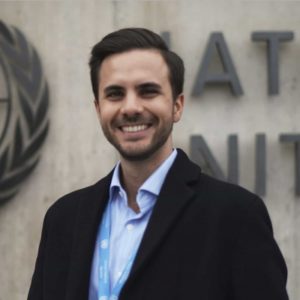Event Cinema
Wednesdays for the Planet | The Digital Globe – How Earth Observation Changed Our World

Wednesdays for the Planet is a series of online screenings and virtual presentations with experts highlighting the natural world and other environmental challenges our planet faces. The virtual screenings are for educational purposes, non-profit and non-commercial.
Documentary
The Digital Globe – How Earth Observation Changed Our World
Presented by WELT Documentary, the program shows how satellites play an increasingly important role in our everyday life. As the climate changes, thanks to sensor and camera technology, radar beams and optical measuring methods, satellites now convey an all-encompassing picture of the Earth that can help us have a better understanding of our planet.
Online Screening
Experts

Steven Ramage
Head of External Relations | Group on Earth Observations
Steven Ramage leads external relations at the Group on Earth Observations (GEO) Secretariat in Geneva, Switzerland. His role involves focusing on the interfaces between science, technology, policy and decisions in support of more than 100 UN Member States. He is on the Governing Boards of Digital Earth Africa and Digital Earth Pacific, a member of the UK Space Agency Earth Observations Advisory Committee and the Advisory Board of EO4GEO.
Steven was an owner/director of 1Spatial before taking on a role as Executive Director of the Open Geospatial Consortium (OGC), and then Managing Director of Ordnance Survey International. Steven is a Visiting Professor at the Institute for Future Cities, University of Strathclyde, Glasgow and a Fellow of the Royal Geographical Society (RGS). He tweets as @steven_ramage

Albert Martinez
Climate Security Analyst | United Nations Environment Programme | Crisis Management Branch
Albert Martinez is a Climate Security Analyst at the Crisis Management Branch of the United Nations Environment Programme (UNEP). His work involves coordinating environmental peacebuilding strategies to strengthen resilience to complex climate change and security risks in conflict-affected settings, and the management of these risks through policy and programme recommendations. Prior to joining UNEP, Albert conducted academic research on the socioeconomic impacts of the extractive industry, and coordinated an international marine conservation NGO in Spain.
Albert holds an MA in International Administration and Conflict Management from the University of Konstanz (Germany), an MSc in Political Science from the Pompeu Fabra University (Spain), and a BSc in Environmental Science from the University of Barcelona (Spain).

Marie Schellens
Environmental Security Analyst | United Nations Environment Programme | Crisis Management Branch
Marie Schellens works as an Environmental Security Analyst at UNEP’s Crisis Management Branch. She leads the theoretical and methodological development of Strata – the Earth Stress Monitor. Strata will be a web-based mapper that helps end-users to easily and rapidly identify where environmental and climate stresses are converging. It aims to support area-specific policy-making and programme planning around environmental and climate security.
Before joining UNEP, she was a Marie Curie PhD fellow at Stockholm University and the University of Iceland, researching the role of natural resources in conflict risk, with qualitative and quantitative tools from the field of complex systems. In October (2020), she successfully defended the PhD on natural resource conflicts. Prior to that, Marie worked with ecosystem-based disaster risk reduction at UNESCO. She received a MSc in Geography jointly from KU Leuven and Free University Brussels (Belgium, 2015).
Virtual Presentations
Links
- Space Science for Achieving the Sustainable Development Goals | International Telecommunications Union (ITU)
- How Observing Earth from Space Protects Our Planet | ITU
- Group on Earth Observations (GEO)
- Open Earth Observation Data | GEO
- 2020-2022 GEO Work Programme | GEO
- Direct Observations Confirm That Humans Are Throwing Earth’s Energy Budget Off Balance | NASA | March 2021
- World Meteorological Organization
- Wednesdays for the Planet
